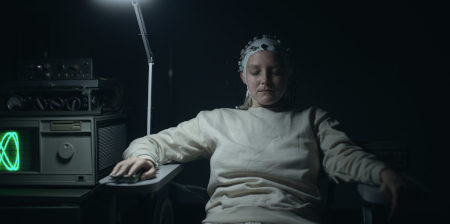366 Weird Movies may earn commissions from purchases made through product links.
Neptune Frost is currently available for VOD rental or purchase.
DIRECTED BY: Anisia Uzeyman, Saul Williams
FEATURING: Cheryl Isheja, Bertrand Ninteretse (AKA Kaya Free), Elvis Ngabo
PLOT: In an alternate-reality African nation, an escaped coltan miner teams up with an intersexed refugee to hack global information systems through their dreams.

COMMENTS: Neptune Frost‘s scenario involves an authoritarian crackdown in an imaginary African country; a resistance movement composed of university students, refugees, and escaped coltan miners; and global hacking accomplished in dreams. With a first act that indiscriminately flips back and forth between two different on-the-run protagonists, one of whom is played by two actors, and dialogue spoken and sung in five different languages, Neptune Frost loses viewers in its thickets early on. And that’s before the first big musical number—in which a dream spirit transports the dreamer into a black-lit, monitor-lined room festooned with spinning rainbow bicycle wheels and advises him (later her) to “hack” into abstract systems like land rights, labor, and greed—even occurs. The film is aware of its own difficulty: a third of the way through, a character addresses the viewer directly: “Maybe you’re asking yourself WTF is this? A poet’s idea of a dream?”
Persevere through the confusion, or at least get yourself into a headspace where you’re not invested in everything adding up in a rational way, and you’ll find much to appreciate in Neptune Frost. Foremost is the music, which ranges from work songs (which carry over into protest songs) to dreamy electronica-based trance chants, and eventually full-bore hip-hop bashes. The African setting—landscapes, dress, flora and fauna—fosters a unique language of images. The costuming tends to the bizarre: background characters have keyboard parts and diodes glued to their clothes and faces, a spirit has a head enclosed in a semicircular wicker cage, the state’s brutal police favor pink uniforms, and Neptune herself sometimes has a bird’s nest on her shoulder. As it progresses, the movie throws datastreams of glitchy cybernetic psychedelia at the screen to represent its mystical hack of the global order. The narrative remains hard-to-follow all the way to the end, but themes of technology, gender, colonialism, and DIY revolutionary politics (local, global, and imaginary) float in and out of the mix. The film’s aesthetic may be Afrofuturist, but its style is Afrosurrealist.
Truthfully, there is almost too much to process in Neptune Frost: both the characters and the events can be a chore to sort out. The film’s concepts are half-hidden in a haze of impressionistic poetry and song (with phrases such as “binary crime,” “martyr loser king,” and “unanimous goldmine” carrying obscure significance); although at other times, messages are delivered bluntly (one song bears the refrain, “fuck Mr. Google”). It’s no surprise to learn that writer Saul Williams is a poet and musician. If Neptune Frost sometimes feels like a concept album brought to life, that may be because there is one: Williams’ 2016 left-field rap album Martyrloserking (and two sequels), plus a graphic novel. This world is much wider than the slice we see in the film, and further exploration may yield more answers than are given here. Neptune Frost comes achingly close to a general “Recommended” rating, and also to a “Weirdest!” rating. But ultimately, while impressive, I think the project’s appeal is decidedly niche: fans of Afrofuturism, proponents pf progressive (verging on radical) politics, and advocates of African film in general (of which we have far too few examples). If you’re not in one of those groups, but have adventurous tastes in cinema and are up for a challenge, then Neptune Frost is also a worthwhile visit: there is truly nothing quite like it out there.
Neptune Frost opens June 3 in New York City and Dallas, expanding to additional art-house theaters through June. We’ll let you know when streaming options get sorted out.
WHAT THE CRITICS SAY:



